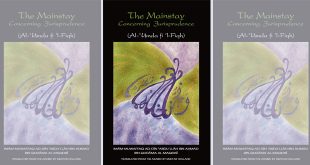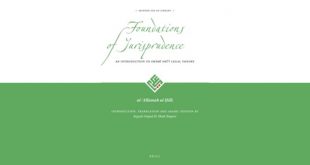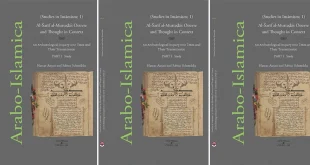This Book is Concerning the Jurisprudence (Fiqh) of Imam of the Sunna, Ahmad ibn Hanbal ash-Shaibani (may Allah be well pleased with him) by Shaikh al-Islam Imam al-Muwaffaq ibn Qudama (A.H. 541-620) was one of the luminaries of his day and age....
Read More »Foundations of Jurisprudence – An Introduction to Imāmī Shīʿī Legal Theory +PDF
Book: Foundations of Jurisprudence - An Introduction to Imāmī Shīʿī Legal Theory published by Brill
Read More »Al-Šarīf al-Murtaḍā’s Oeuvre and Thought in Context: An Archaeological Inquiry into Texts and their Transmission +PDF
This book is a detailed analysis of the reception and transmission of the doctrinal, legal, literary, and exegetical oeuvre of al-Šarīf al-Murtaḍā, arguably one of the most important thinkers of the medieval period, within and....
Read More »Call for Papers: Moratoriums on Islamic Criminal Punishments: Legal Debates and Current Practices
The Journal of Islamic Law invites papers that explore both theoretical discussions and practical applications concerning the ḥudūd, penalties that Muslim jurists consider to be divinely ordained punishments for a Special Issue on “Moratoriums on Islamic Criminal Punishments: Legal Debates and...
Read More »Between Hadīth & Fiqh: The “Canonical” Imāmī Collections of Akhbār+PDF
In Imāmī legal theory, the akhbār of the Imams form one of the material sources of law, alongside the...
Read More »Brief History of Shia Jurisprudence and Jurisprudents
Jurisprudence has a history of eleven hundred years, meaning that for eleven centuries, without a break
Read More »The Role of Reason and Syllogism in Ijtihad
Some schools of fiqh which supported qiyas, especially the Hanafi school, believed in the role of reason in ijtihad....
Read More »The Manḥāj of Fiqh al-Ḥadīth by Shaykh Ḥurr ʻĀmilī on the basis of Wasāʼil al-Shīʻa
The present paper is such a philosophical theological Inquiry by which an observation about the Manḥāj of Ahl al-Ḥadīth by Shaykh Hurr Ameli on the basis of Wasāʼil al-Shīʻa has been provided...
Read More »Prophet’s Marriage to ‘Āyisha, A Hadith that Become a Reason for Islamophobia
The subject of my thesis was the famous and controversial hadith about the Islamic prophet Muḥammad’s marriage to his wife ʿĀʾišah bt. ʾabī Bakr at a young age: according to the dominant version of the hadith, she was six or seven at the time of her marital engagement, and nine at the time of her....
Read More »The Jurisprudential Sects of Islam
The divisions of Muslims became widespread after the murder of the third khalīfa, ‛Uthmān bin ‛Affān. At that time the Muslims swore allegiance to Imām ‛Alī bin Abī Tālib (a) but Mu‛āwīyah bin Abī Sufyān refused to swear allegiance to...
Read More » Ijtihad Network Being Wise and Faithful Muslim in the Contemporary World
Ijtihad Network Being Wise and Faithful Muslim in the Contemporary World









